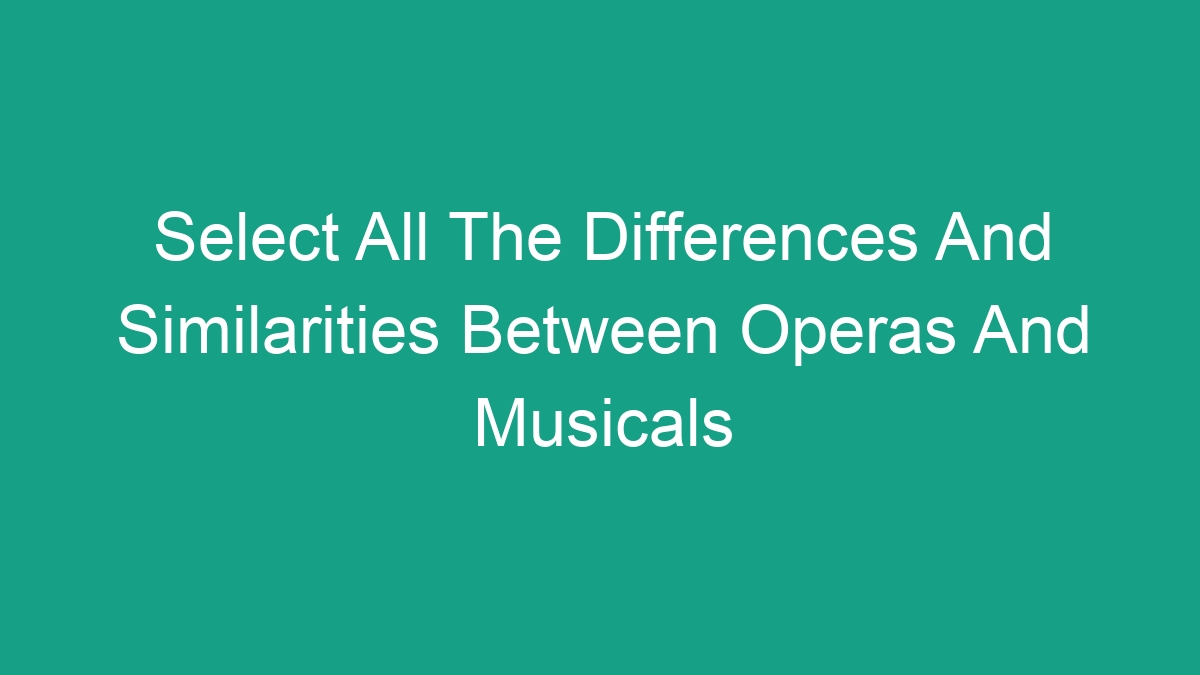
Introduction
When it comes to theatrical performances, opera and musicals both hold a special place in the hearts of audiences. While both forms of entertainment involve music, singing, and storytelling, there are several key differences and similarities between the two. In this article, we will explore the various aspects of operas and musicals, comparing and contrasting them to provide a comprehensive understanding of what sets these two art forms apart and brings them together.
Historical Background
Operas have a long and rich history, dating back to the late 16th century in Italy. The first opera is considered to be “Dafne” by Jacopo Peri, which was performed in Florence in 1598. Operas typically involve singing throughout, with little to no spoken dialogue. They often focus on grand and dramatic storytelling, with elaborate costumes, sets, and orchestral accompaniment.
On the other hand, musicals have a more recent origin, emerging in the United States in the early 20th century. Musicals incorporate a blend of spoken dialogue, music, and dance to tell a story. They are often light-hearted and entertaining, with popular songs and memorable dance numbers complementing the storyline.
Music
One of the key similarities between operas and musicals is the central role of music in both forms of entertainment. In operas, the music is often classical and operatic, with arias and recitatives conveying the emotions and motivations of the characters. The music in operas is typically sung in the language in which the opera was composed, be it Italian, German, French, or another language.
In contrast, musicals feature a wide range of musical styles, including jazz, pop, rock, and traditional Broadway tunes. The songs in musicals are often catchy and memorable, serving to move the plot forward and express the characters’ feelings. Additionally, the lyrics in musicals are usually sung in the language of the audience, making them more accessible to a broader range of individuals.
Storytelling
Another difference between operas and musicals lies in their storytelling approaches. Operas tend to feature grand and often tragic narratives, drawing on historical events, myths, or legendary tales. The focus is on the emotions and conflicts of the characters, with a strong emphasis on vocal and instrumental virtuosity. Operas often deal with weighty themes such as love, betrayal, and power, and they are known for their intense and dramatic storytelling.
On the other hand, musicals typically showcase lighter and more accessible plots, often revolving around romance, comedy, or social issues. Musicals incorporate spoken dialogue alongside the musical numbers to propel the storyline forward. While they may also touch on serious topics, such as discrimination or political unrest, the overall tone of musicals tends to be more uplifting and entertaining.
Performance and Staging
The performance and staging of operas and musicals also differ significantly. Operas usually feature elaborate and grandiose sets, with intricate costumes and dramatic lighting adding to the overall spectacle. The focus is on the vocal and instrumental performances, with the orchestra often placed in a prominent position in the theater. Operatic performances typically require extensive vocal training and operatic technique to fill a large theater with sound, as well as the ability to convey deep emotions through singing.
In contrast, musicals often have more flexible staging, making use of rotating sets, projections, and other modern technologies to create diverse and dynamic environments. The choreography and dance routines play a more prominent role in musicals, with ensemble numbers and large-scale production numbers adding to the visual appeal. While vocal talent is still essential in musicals, performers are often required to have a mix of singing, acting, and dancing abilities in order to excel in this form of entertainment.
Language and Accessibility
A major difference between operas and musicals is the language in which they are performed. Operas are often performed in their original language, which can be a barrier for audiences who do not understand the language. While surtitles and translations are often provided, the focus of the performance remains on the music and singing rather than the spoken word.
In contrast, musicals are typically performed in the language of the audience, making them more accessible to a wider range of viewers. This linguistic accessibility allows for a broader appeal and makes it easier for audiences to engage with the storytelling and emotional content of the performance.
Conclusion
In conclusion, operas and musicals share a common love for music, singing, and storytelling, but they also have distinct differences that set them apart. Operas are known for their grand and dramatic storytelling, classical music, and emphasis on vocal and instrumental virtuosity, while musicals provide lighter and more accessible entertainment, blending music, dialogue, and dance to tell engaging stories. Understanding the unique features of each art form allows audiences to appreciate the diversity of theatrical performances and enjoy the rich tapestry of musical and operatic experiences.



